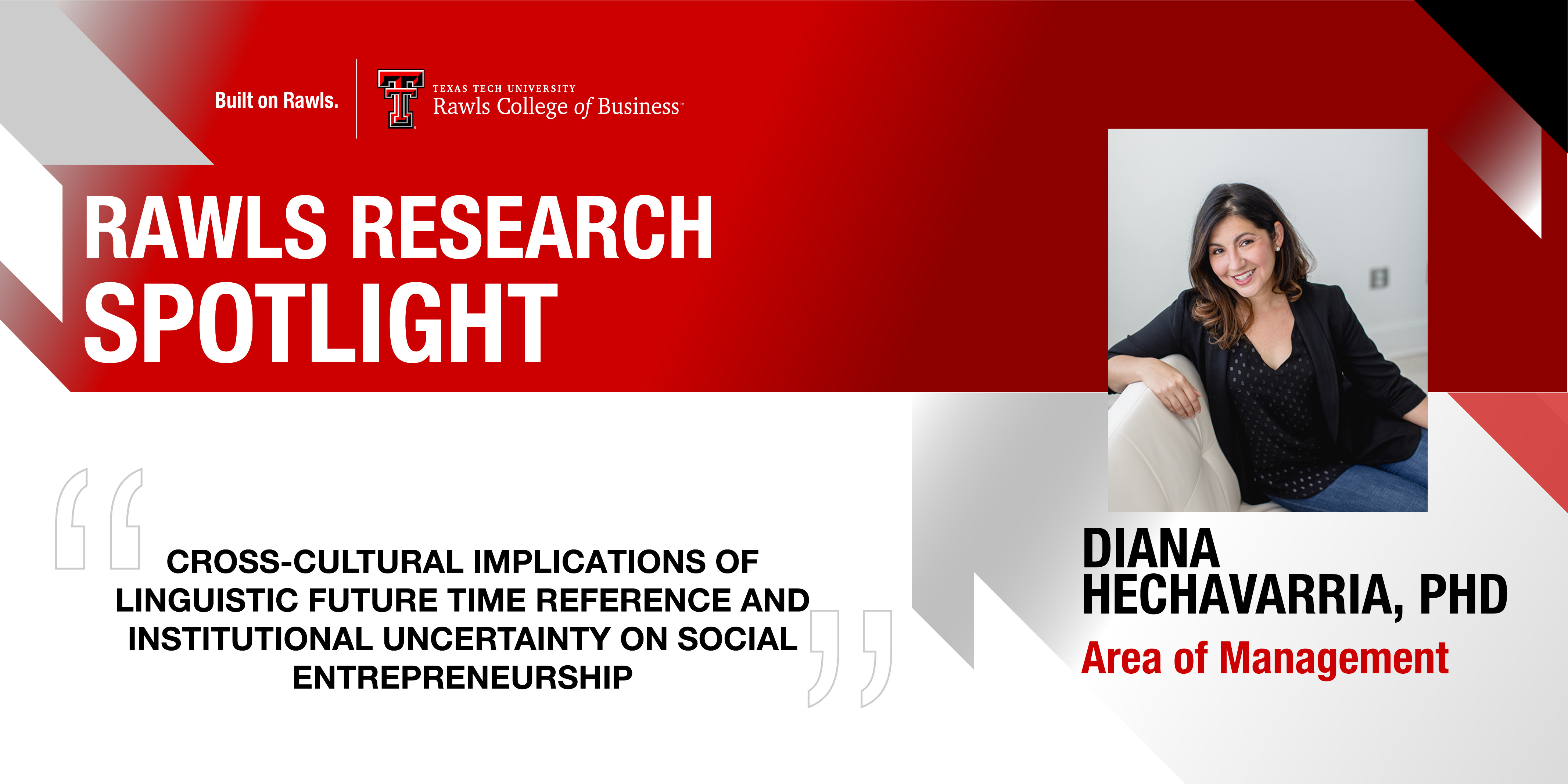Rawls Research: Language and Uncertainty Lead to Social Entrepreneurship
This study looks at the ways a person's language can create implicit biases that impact their entrepreneurial habits.
Jacob Gordon | February 15, 2023

Spotlights
- Hechavarria and her collaborators ran a cross-cultural study to analyze how an entrepreneur’s language may lead them to commercial or social entrepreneurship.
- Social entrepreneurship becomes more likely when an entrepreneur’s language has strong future time reference and there is greater institutional uncertainty within the entrepreneur’s society.
Language not only helps us communicate with other people, but it helps us understand and process the world and society in which we live. It stands to reason then that the language a person utilizes could have a drastic impact on how that person may make decisions.
The idea of language creating an implicit bias is at the heart of an article published in a recent edition of the Strategic Entrepreneurship Journal by a group of researchers, including Diana Hechavarria, associate professor of management at the Jerry S. Rawls College of Business. More specifically, Hechavarria and her collaborators wanted to see if a language’s future time reference (FTR) creates an implicit bias that can influence an entrepreneur towards engaging in social entrepreneurship activities.
FTR is essentially the rules of a language that requires its speakers to mark time in the future and non-future. For example, English has clear markers to distinguish future and non-future references. When speaking about the present, a person would say “It is cold;” when speaking about the future, a person would say, “It will be cold” or “It is going to be cold.”
“I am bilingual, and I realized I understood time differently than my friends who were not bilingual due to my native language,” said Hechavarria. “I started questioning how language shapes thought and ultimately behavior.”
In “Cross-Cultural Implications of Linguistic Future Time Reference and Institutional Uncertainty on Social Entrepreneurship,” the researchers ran a cross-cultural global study that analyzes over 205,000 individuals in 70 countries with 39 different languages. The primary data source was from Global Entrepreneurship Monitor’s Adult Population Survey.
To determine if the survey respondents would be more likely to become social entrepreneurs, the survey data was matched to several variables, including a respondent’s spoken language and institutional uncertainty.
For spoken language, respondents were divided into two categories: weak FTR and strong FTR. Weak FTR languages do not necessarily mark the future with specific verb tenses while strong FTR languages do. In other words: weak FTR languages are futureless and strong FTR languages are futured.
To demonstrate these two categories, the researchers compared English (strong FTR) with Finnish (weak FTR).
In English, a speaker will say, “It will be cold tomorrow,” or, “It is going to be cold tomorrow.” It would be a bit strange for the speaker to say, “It is cold tomorrow.”
That is not the case in Finnish, however. In Finnish, “Huomenna on kylmää,” grammatically equates to, “Tomorrow is cold.”
“A weak FTR speaker locates future events subjectively closer to the speaker’s own temporal position and is thus more likely to speak of the future as similar to the present and will not decouple the present from the future,” wrote the researchers. “Contrastingly, strong FTR language speakers habitually decouple tomorrow from today and speak of future events as more remote or distant.”
Regarding institutional uncertainty, the researchers examined respondents across three categories: weak property rights, weak rule of law or strong corruption.
“Formal rules around property rights can decrease institutional uncertainty because it provides enforcement mechanisms around property ownership,” wrote the researchers. “Rule of law can also decrease institutional uncertainty because it guarantees the independence of the judiciary, freedom from state despotism, equal treatment of people, and provides mechanisms around contract enforcement for organizations. Corruption can increase institutional uncertainty because transactions are less transparent and susceptible to opportunism.”
In the end, the analysis showed that language could, in fact, create an implicit bias within people, which would make it more likely they become social entrepreneurs. Specifically, people whose language has strong FTR are more likely to become social entrepreneurs than people with weak FTR. Hechavarria notes that speakers from strong FTR languages are better able to differentiate between present and future concerns and will work to address short-term societal issues.
Additionally, the analysis showed that entrepreneurs from countries that have greater institutional uncertainty are more likely to become social entrepreneurs. The demand for social entrepreneurship is greater when there are undefined laws, individual and political rights are suppressed, there are greater risks to losing property, and there are high levels of corruption.
Along with helping entrepreneurs better understand why they may find themselves more likely to engage in social entrepreneurship activities, Hechavarria hopes this analysis helps researchers better understand the conditions that cause social entrepreneurship.
“We cannot fully understand economic outcomes such as social entrepreneurship without considering the institutional context within which that outcome emerged.”
Read the full articleRawls College of Business
-
Address
Rawls College of Business, Box 42101, 703 Flint Avenue, Lubbock, TX 79409 -
Phone
806.742.3188 -
Email
ba_webmaster@ttu.edu
